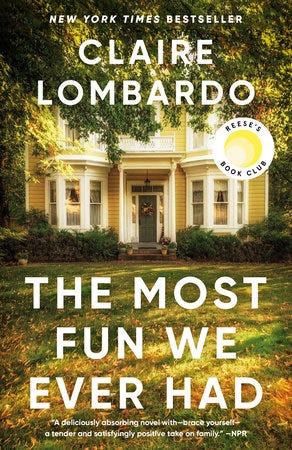Three Great Books #33
Including two absorbing novels and a practical guide to AI
The Other Valley, by Scott Alexander Howard
Odile Ozanne lives in a small town in a valley. It contains a lake and is surrounded by mountains; in the next valley to the east, it’s the same setup, but 20 years in the future. In the neighboring valley to the west, it’s 20 years in the past. This pattern repeats, apparently ad infinitum (how or why is never explained). Odile is finishing up school and is applying to be an apprentice to the Conseil, the civic body that adjudicates residents’ requests to travel to neighboring villages to see past or future iterations of their loved ones. Because of the potentially harrowing implications of time travel, those who are approved to visit the past or future are escorted by a gendarme, and all are masked to avoid recognition. Odile is in the schoolyard when she sees an escorted couple observing the scene; one of their masks slips off, and she recognizes her the mother of Edme, one of her classmates, who she has recently gotten to know better. There’s only one reason for their presence: Edme will die in the next 20 years and they wanted to travel to the past to to see him. Odile knows she’s not allow to tip him off or to do anything to alter the course of events, but is there anything she can do? It sounds very high-concept, but it feels much more literary, thanks to Howard’s wonderful descriptions of place. This will be one of my favorites of the year.
Co-Intelligence: Living and Working with AI, by Ethan Mollick
If you are already in the thick of using AI, this book probably isn’t for you. But if you, like me, are wondering how many years your chosen professional field has left before it’s replaced by AI and want to know how to use tools like ChatGPT in the interim, this is an excellent, clear, and really engaging place to start. Mollick, a professor at Wharton, begins by saying that the cost of getting to know AI — that is, really understanding it — is at least three sleepless nights. That’s because once you grok its current and near-term capabilities are, you’re going to have all kinds of big questions about the prospects for your life, and those of your children and grandchildren. “You realize the world has changed in fundamental ways and that nobody can really tell you what the future will look like,” he writes. I appreciate that Mollick doesn’t spend too much time lingering on the theoretical question of whether AI will kill us all, and instead talks about how it will change almost all of our jobs. (Only 36 of 1,106 job categories have no overlap with AI, including dancer, athlete, roofer, and motorcycle mechanic, he says.) “We are going to need to reconstruct meaning, in art and in the rituals of creative work,” he writes. “This is not an easy process, but we have done it before, many times.” I finished this and was inspired to start working with ChatGPT to do more than party tricks like “Write a limerick in the style of Stringer Bell from ‘The Wire’.”*
The Most Fun We Ever Had, by Claire Lombardo
I’ve had a hard time really getting sucked into novels this year, but my streak was broken by this addictive doorstop of a book — I read all 624 pages over a single weekend. This is what every review calls “a sprawling family saga,” focusing on the seemingly idyllic marriage of Marilyn and David Sorenson and their four daughters: Wendy, who suffered two major losses and is now understandably unmoored; Violet, a stay-at-home mother with three sons, only two of whom her parents know about; Liza, a tenured professor who is pregnant by her depressed boyfriend and having second thoughts about the relationship; and Grace, who is trying to find her way after college graduation and ends up lying to her family about attending law school. All of them idealize their parents’ marriage to some extent, holding it up as an unachievable ideal, without realizing that it’s taken work to maintain and has had its own rough patches over the years. There are lots of family secrets (Violet’s son Jonah, who she placed for adoption years ago, re-enters the scene), difficult sibling dynamics, arguments, and tragedies. (One note on the latter: this book includes a description of a stillbirth, so please take care if that’s not something you want to read about.) The main action is set in 2016, with flashbacks to various points in time. That was a tumultuous year, but this book ignores any mention of the election or really much else beyond the generally comfortable environs that are the frame for the Sorenson family’s activities; that may bug you or be just what you need.
*Here’s what ChatGPT came up with (not bad!):
In the game, I play it real slick,
With hustle and flow, I'm quick.
From corners to streets,
My empire repeats,
In this life, I'm the one you can't trick.




I love the title of the book on AI. I recently started experimenting with Co-pilot (Microsoft) and it’s a lot of fun, but it really needs my knowledge and critical decision-making faculties to be really effective/useful, so I agree it feels collaborative. I may be kidding myself, of course! 😀 I like using it to give me ideas and then I can pick my way through them to see what interests me.